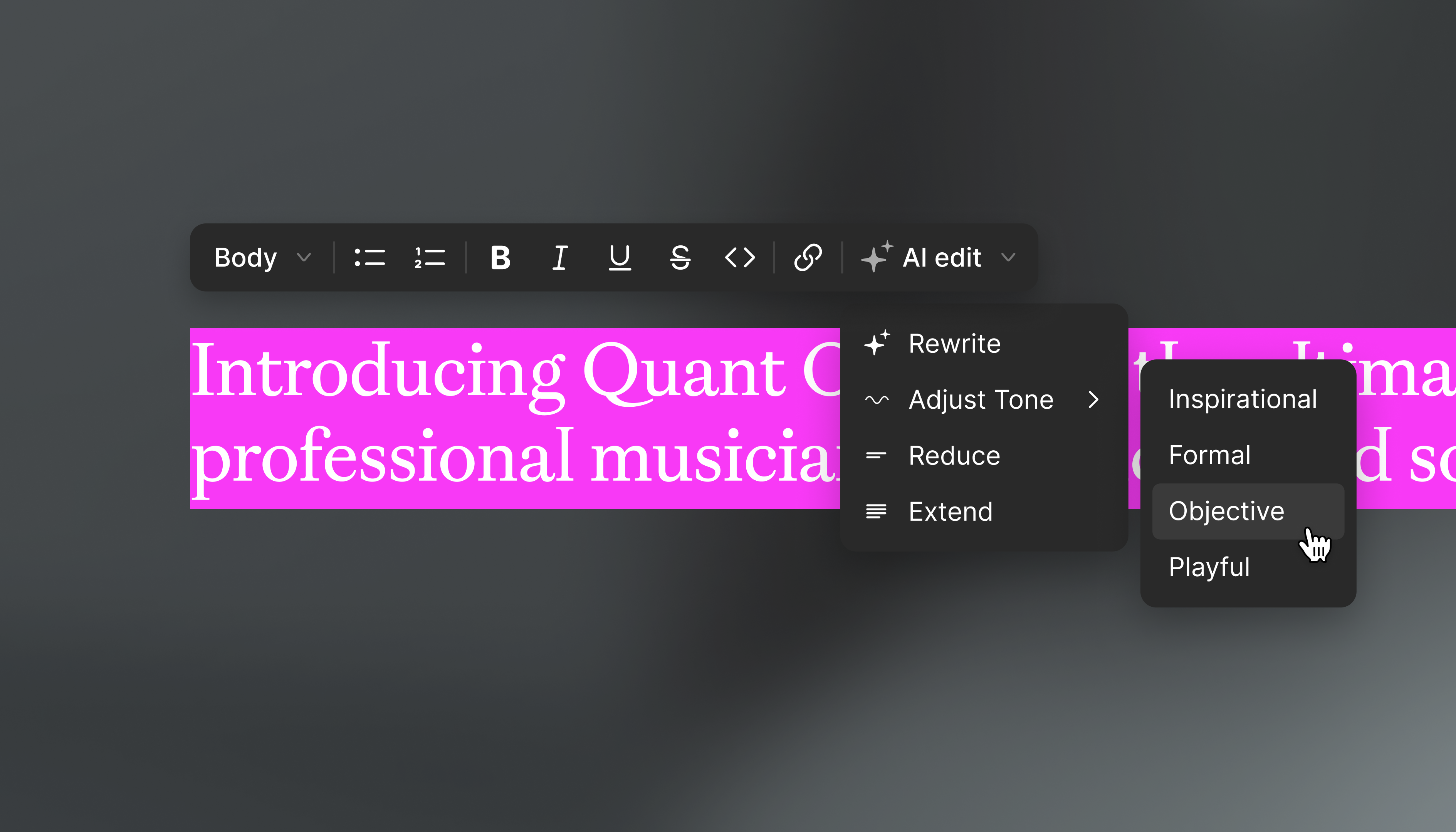Tips of the trade
How to Leverage AI for Sales Teams
Leading sales teams are using AI to supercharge their CRMs, prospect more efficiently, and create sales enablement materials.

High-performing sales teams are almost twice as likely to use artificial intelligence (AI) than underperforming sales teams. Why do high-performing teams love AI technology?
AI is a powerful lever for unlocking scale: by automating routine tasks and offering a jumpstart on generative work like writing emails or creating materials, AI allows sales reps to spend more time focused on what they do best—selling.
Despite its potential, only one-third of respondents in a 2023 McKinsey survey reported their organization used generative AI—meaning there’s still time to get ahead of the curve. Still feeling like a newcomer and not sure where to get started? Below, we’ll walk through what AI for sales includes, and some of the best ways to use artificial intelligence in sales.
What is artificial intelligence (AI) in sales?
AI in sales is the application of artificial intelligence within the sales process to improve quality and efficiency. Different branches of AI include generative AI (gen AI), machine learning (ML), and natural language processing (NLP). Sales teams use each branch of AI in a variety of ways: to handle time-consuming data entry or data analysis, to create forecasts, to summarize data, to generate first drafts of communications, and even for onboarding and ongoing sales training. Because AI mimics human intelligence, it can automate certain tasks that would otherwise be done by a human, like creating a sales call recap with action items.
Example of AI for sales
A common example of AI for sales is AI-enabled call recording software that accurately transcribes sales calls using natural language processing. Generative AI can then create a summary of what was said and provide feedback on your sales reps’ performance on the call. It could then aggregate data across many sales calls and provide insights about competitor mentions or keywords that signal higher quality leads.
The benefits of AI for sales teams
The number one way AI can benefit sales teams is simple and impactful: it can increase revenue. It’s estimated that 84% of salespeople using generative AI say it increases sales by improving and accelerating customer interactions. McKinsey's research backs this up: companies that invest in AI see a 3–15% increase in revenue.
Here’s how AI can contribute to the bottom line:
- Better customer interactions. As customers do increasing amounts of research before ever talking to a salesperson, sellers need to provide tailored insights, not just product information the customer has likely already seen online. With its ability to quickly analyze customer data, AI allows sales reps to quickly provide customers with personalized insights that would have otherwise taken hours of research.
- Greater forecasting accuracy. Predicting future revenue is a necessary but perennially difficult task for sales teams. Sales forecasts based on intuition are often incorrect, but forecasting using large amounts of data can be incredibly time-consuming. AI models are built to quickly ingest and analyze large datasets, so they can deliver data-driven forecasts in a fraction of the time it would take a human analyst.
- Improved prioritization: No sales rep wants to waste time going after leads that will never close. New AI-driven sales tech provides data-driven lead scoring with algorithms that factor in hundreds of customer data points to tell your reps exactly who to prioritize.
How sales teams can use AI: 7 applications of AI for sales
AI technology is transforming virtually every aspect of sales, . Here are seven applications that are saving leading sales teams time, effort, and headache:
1. Prospecting
A common example of AI for sales is lead generation. Arnie Gullov-Singh, fractional CRO at The Revenue Architect, uses generative AI to transform his prospecting spreadsheets into a custom database that he can query with natural language. “I like to use the GPT plug-in for Google Sheets,” Gullov-Singh says. “You can plug in a bunch of leads and have it tell you: what does this company do, what category are they in? Or you can give it a bunch of job titles and say, ‘What level are these people at?’”
In addition to data extraction and summarization, Gullov-Singh notes customization as a benefit of AI. “The cool thing about AI is that you can tell it which categories to use and then it will force-fit everything into your category tree, versus trying to use some third-party taxonomy that doesn’t make sense for your business.”
2. Customer relationship management (CRM)
Your customer relationship management (CRM) software should function as a gold mine of customer data, but it doesn’t always live up to its potential.
New AI features promise to solve some of the most common problems sales leaders have with their CRM: keeping the CRM up-to-date, and easily analyzing data within the CRM system.
Keeping the CRM updated is so time consuming it either cuts into the time sales reps could spend prospecting, or reps skip it altogether. One solution is AI-powered call tracking software, which automatically logs calls in your CRM database and provides a brief summary and action plan for each call.
Additionally, predictive lead scoring tools use machine learning to analyze customer data from your CRM plus other data points like company size and website and social media visits to predict how likely a lead is to close. The software then organizes your contacts into tiers of contact priority accordingly, helping you know which leads to prioritize.
3. Knowledge hub work assistant
Many sales teams use an information hub like Notion or Google Workspace to store documentation, but these tools can quickly lead to information overload, and reps may struggle to find the information they need when they need it. AI can quickly pull, summarize, and organize relevant data, so it makes sense to integrate the technology into your knowledge hub.
Tools like Notion and Coda now offer AI assistants. With Notion, you can ask the AI assistant to summarize, generate a meeting agenda, or find action items based on the contents of a page. You can also add an AI column to an existing table to generate output based on the information in each row. For example, your AI column prompt could be “Next steps based on initial sales pitch.” You could then use those AI results to draft your follow-up emails.
4. Writing assistant for high-volume outreach
In 2023, basic content creation was the main way salespeople used generative AI. An AI writing assistant can save reps time by quickly generating copy for emails and other communications. For those tasked with a high volume of outreach, writing assistants can help them save time drafting and personalizing content.
The best-known AI writing assistant is ChatGPT, a large language model (LLM) trained by OpenAI to work in a dialogue with the user. Because it’s designed to work conversationally, you can ask ChatGPT to write a sales email and then provide feedback like “make it more formal” or “add a statistic from this report.”
5. Sales forecasting
Sales quotas are based on forecasts, but forecasting—predicting how much revenue your team will bring in each quarter—is a perennial challenge in sales, which can lead to a lack of confidence in team performance.
Part of the problem is that quotas based on gut instinct often miss the mark, while data-based forecasting can take an incredible amount of human time and effort. AI sales forecasting tools can help you achieve a more accurate outlook and set more realistic goals in less time.
AI excels in processing and distilling large amounts of data. AI-powered revenue platform Clari uses historical data from your CRM to forecast revenue each week, month, and quarter. Clari also tracks individual deals, flagging those that may be at risk when they deviate from the characteristics of your company’s closed deals.
6. Creating sales materials
Elegant and eye-catching sales materials are integral to your go to market (GTM) motion. Potential customers want to see presentations, custom proposals, case studies, and more as they consider, but creating and personalizing these assets for prospects takes time.
Tome’s AI-powered canvas allows you to apply the power of a writing assistant to a multimedia presentation. Reps can prompt Tome’s AI to create a page, an image, or text in seconds, and pull from the branding on your website to customize the presentation. Materials don’t have to fit neatly into a traditional slide deck format, as Tome blends the page-flipping, visual format of a slide deck with the infinite scroll capability of a web page—and optimizes for mobile viewing.
Professionally designed templates are also available for everything from a capabilities overview to a one-sheeter, allowing you to make the most of the tool’s innovative medium.
7. Onboarding and training
AI promises to transform the sales training process from onboarding to ongoing development by helping leaders provide coaching, role playing opportunities, and materials to their team—benefitting new hires and veteran reps alike.
- Coaching. AI sales coaches can provide real-time feedback and talking points during a sales call. That’s the premise of Dialpad’s Real-Time Assist feature, which transcribes calls as you speak and drops notes like “You’re speaking too fast, slow down!” throughout the call. It also shares relevant information when triggered by key phrases. Dialpad’s AI-assist feature is available with Premium sales center plans, which run $150/month when billed annually.
- Role play. Role play is a classic sales-training technique, allowing new hires to practice real-world scenarios and develop their skills without risking live opportunities. With AI, conversational bots can replace human role-playing partners—which keeps more senior reps focused on selling. The Second Nature app places sales reps on video calls with a “live action” chatbot that looks remarkably like an actual human (though their robotic voices give them away). Pricing for Second Nature is available upon request.
- Materials creation. As onboarding becomes increasingly asynchronous, the need for materials increases. AI content generation assistants help you create everything from one-sheeters to case studies to lengthy training presentations more quickly. Tome creates pages, images, and text based on your prompt in seconds, and the flexible format supports multimedia embeds like video narration, so that nuances aren’t lost in the self-guided learning experience.
The Future of Sales: Will AI Replace Sales Teams?
AI is a game-changer for sales teams, offering innovative solutions for training, sales enablement, and streamlining sales processes. Discover how sales teams are leveraging Tome to stay ahead in this AI-driven era.

Win new business with a modern approach to storytelling. Get started for free.
You may also like...

Learn the basics of B2B content marketing, including essential formats and the five key steps to success.

Three popular ways to use AI in sales training, including materials creation, role-playing, and personalized coaching.